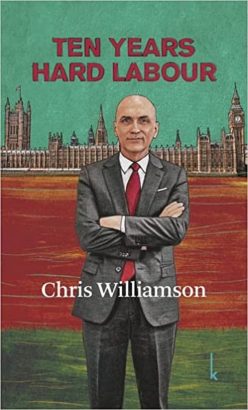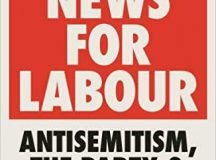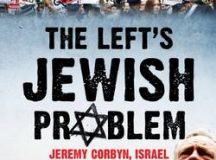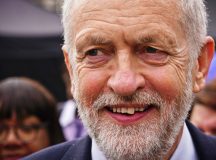Chris Williamson was a Labour Member of Parliament representing the constituency of Derby North. He served as Shadow Minister for Fire and Emergency Services under both Ed Miliband and Jeremy Corbyn. Williamson was a staunch ally of Jeremy Corbyn during his tenure as leader of the party and a controversial figure particularly once re-elected to Parliament in 2017. This was mainly due to his comments concerning antisemitism.
Williamson provoked concern when he referred to antisemitism concerns in the Labour Party as ‘proxy wars and bullshit’, he tweeted support for Holocaust denier Gilad Atzmon, (which he later deleted) and supported various activists who were expelled from the Labour Party for issues connected with antisemitism. Williamson’s book, Ten Years Hard Labour, offers his perspective on these events and an insight into the way of thinking that led him into a pattern of behaviour that would set him on a collision course with the Jewish community and the Party he had spent most of his life campaigning for.
Williamson has just shy of 100,000 followers on his Twitter account and is currently fronting a weekly half hour long programme called ‘Palestine Declassified’ which is produced by former Bristol University Professor David Miller and broadcast by Iranian State TV company Press TV. The programme has been accused of invoking antisemitic tropes since it started. He runs a group called Resist which has been proscribed by the Labour Party, meaning that any Labour Party members publicly supporting it are liable for expulsion.
The book comes in at 394 pages which includes almost 100 pages of notes, appendix and index. While billed as covering the 10-year period from 2010 to 2020, the Miliband era, ending in 2015, is dispensed with by page 41. The rest of the book is devoted to Labour politics during Corbyn’s term as leader of the Labour Party and the antisemitism crisis that engulfed the Party during those years.
Williamson first won the seat of Derby North for the Labour Party in 2010 with a slender majority of 613. He lost the seat in 2015 only to return to Parliament as part of the better than expected performance of Labour at the 2017 general election. From 2017 until his suspension in 2019 it is fair to say that Williamson represented for many one of the main symbols of Labour’s antisemitism problem. According to Williamson this is because he was ‘in the crosshairs of the Zionist lobby.’ A lobby which he describes as ‘aggressive’ and ‘fanatical’. He claims that the Equalities and Human Rights Commission, which found that Labour had behaved unlawfully to its Jewish members had been ‘appropriated by the Zionist lobby’. What precisely the Zionist lobby is we are left to ponder. In the opinion of this author the Community Security Trust, Board of Deputies of British Jews and Jewish Leadership council, Campaign Against Antisemitism, BICOM and the Jewish Labour Movement are all mentioned in the book as if they are a part of it.
Williamson’s avowed support for Corbyn hasn’t stopped him from criticising his approach as Labour leader, or of the left of the party more generally. Williamson is particularly savage in his criticism of the Socialist Campaign Group (SCG), a group of left-wing Labour MPs he claims were ‘frightened of their own shadows’ and who he criticises for not showing him solidarity. Williamson claims that he was eventually prevented from attending SCG meetings. He also blames ‘the coercive tactics of the PLP, corporate media, and the Israel lobby’ for the decision made by the General Secretary of the Labour Party, Jenny Formby to suspend him after it was widely reported that he had claimed that the Labour Party had been ‘too apologetic’ regarding antisemitism.
Williamson devotes some time to discussing the issues surrounding this suspension. Of the claim that he had said the party had been too apologetic regarding antisemitism in Labour he writes: ‘I had said nothing of the sort. I had said that Labour should stop apologising given that, in fact, the party had done an excellent job of tackling the “scourge” of Judeophobia.’ Williamson claims he regrets apologising for those comments ‘because my qualified apology was weaponised by Tom Watson’s PLP posse, which was then accentuated by the corporate media and the Zionist lobby.’
Despite claiming that he was misquoted, Williamson criticises Corbyn because ‘rather than rebutting the “antisemitism” smears, he indulged them.’ He refers to a ‘fake “antisemitism crisis”’ within the Labour Party. In fact, the book is peppered with references to the ‘smear’ of antisemitism and also claims it was ‘bogus’. The attempt to argue both that he thinks that the Labour Party had done an excellent job of tackling the ‘scourge of Judeophobia’ and that it was a ‘smear’ at the same time appears to be contradictory.
Williamson claims that fellow MP Naz Shah’s public apology for her own previous antisemitic discourse was ‘craven’ and that one of her posts, implying that Jewish Israelis should leave their homes and live in the USA was ‘a perfectly reasonable and moderate observation to make’ adding that ‘there was no way that I was going to fold like a deck of cards as Shah had done in the face of a coordinated smear operation by the Zionist lobby.’ He goes on to say that Shah ‘had willingly submitted to the metaphorical lobotomy, which meant surrendering to the Zionist lobby to save her parliamentary career. That was not a path that I was prepared to tread.’
Williamson publishes details of private messages and conversations between himself and members of the Parliamentary Labour Party. He describes a conversation between himself and Lisa Nandy (now Shadow Secretary of State for Levelling Up, Housing and Communities) at Labour Party conference in 2016 where she complains of facing attacks both online and within her constituency from ‘trolls’. He characterises her complaints of abuse as an example of a ‘persecution complex’ and claims she has a ‘vivid imagination for non-existent conspiracies’.
Yet when it comes to conspiracies it is Williamson, not Nandy, who claims that ‘the Labour Party is a victim of state capture. Much of its international policy is now effectively dictated by the State of Israel.’ And that ‘Sir Keir demonstrated, even before being elected Labour leader, that he would be a safe pair of hands to enact the State of Israel’s interests.’ Williamson further laments that during the Labour leadership election of 2022 ‘Sir Keir also prostrated himself, like the other two leadership candidates, before supporters of settler-colonialism.’ In a section entitled ‘The Spread of Israeli Colonisation’ he indicts ‘Jeremy Corbyn’s abject failure to rebut, deconstruct, and expose the lies levelled against him about “antisemitism”’ claiming this failure ‘has had knock-on effects for the entire anti-imperialist left in Britain.’ Indeed it was under Corbyn, he argues, that ‘the Labour Party effectively served as an incubator for the Israel lobby to battle-test their character assassination strategies.’
So important is it to attack the very idea of antisemitism that Williamson devotes a chapter to it entitled ‘The “Antisemitism” Agenda’. He claims the complaints about antisemitism in Labour were ‘never about tackling prejudice against Jews. It was about smashing the pro-Palestine left, undermining the confidence of their convictions and the passion of their internationalist instincts. Of course, malicious cries of “antisemitism” are nothing new, nor should it have been controversial to call them smears. And yet, it reached a point where even questioning the validity of “antisemitism” accusations became a form of “antisemitism” in itself (so-called “denialism”).’
He goes so far as to attack the use of the word ‘antisemitism’ to describe anti-Jewish hatred, making the claim that ‘In the twenty-first century, anti-Semitism is thankfully a relatively rare phenomenon, to which only a small number of genuine neo-Nazis subscribe. The term anti-Semitism, therefore, has become specious when applied to anti-Jewish prejudice in the modern day. The only meaningful contemporary term that describes hatred of Jews as Jews, and which is not imbued with Nazi pseudo-science and racialisation, is “Judeophobia”.’
He then adds, probably influenced by Norman Finkelstein, that ‘the weaponisation of anti-Semitism has been a longstanding feature of the State of Israel’s propaganda efforts across the world. During and after the period of the 1973 Ramadan War, the state’s Ministry of Foreign Affairs developed and promoted the concept of the “New Anti-Semitism” in order to fight a growing anti-Zionist surge.’
Williamson quotes two scholars working to understand anti-Jewish hatred to justify his point that ‘New Anti-Semitism [is] a concept specifically created to attack anti-Zionists’ and that ‘”antisemitism” is a propaganda term, designed to meld distinct periods of European anti-Jewish history into one, and to promote Islamophobic myths.’ Furthermore, Williamson claims that ‘the Rothschild conspiracy was made notorious in Nazi Germany and, since that time, has been found predominantly among the political right, supported by the likes of David Icke.’ This view, that Rothschild and Icke are limited to the right, appears to be undermined by the fact that the National Director of his Resist project, former union activist Sian Bloor, was suspended from the Labour Party for claiming Jeremy Corbyn had the ‘full force of the Rothschild Zionist agenda drawing down on him’.
Williamson appears to view antisemitism within the Labour Party as a lie that was repeated to attack Corbyn by a loose coalition that he refers to variously as the ‘Zionist lobby, and the right-wing corporate media’, ‘the Zionist lobby and the right-wing dominated PLP’, ‘the Zionist lobby and the neoliberal Establishment’ or ‘the saboteurs in the party’s bureaucratic machine, the right-wing PLP malcontents, the reactionary old guard in the CLPs, and the Zionist lobby’.
Regarding Zionism, Williamson argues that:
Perpetuation of the ‘collective trauma’ myth helps to legitimise the establishment of the Zionist state in 1948 and to justify the continued colonisation by Zionists of Palestinian land. This Zionist propaganda should be challenged, not indulged. Jewish communities should be reassured that they are secure, and that they are, and will continue to be, welcome in their own countries of origin. The British left should say clearly that the place for British Jews is within Britain, not Palestine.
Williamson may well be surprised to learn that the key mission of the Community Security Trust, Board of Deputies and Jewish Leadership Council, organisations he has criticised in Ten Years Hard Labour, is to facilitate Jewish life in the UK and to ensure that Jews are able to participate in British society in any way they see fit.
With this in mind it’s interesting to note how Williamson describes the support he saw for George Galloway among Muslim youths in the constituency of Batley and Spen: ‘their support was unsurprising, given Galloway’s long history of opposing Western aggression against Muslim-majority countries.’ Williamson engages in ideological gymnastics to avoid coming to the similar conclusion that British Jewish support for MPs supportive of the only Jewish majority state might also be ‘understandable’. Had he been able to see the support of the Jewish community and its representative bodies for Israel in these terms it’s possible that he would have been able to avoid going down the rabbit hole that has led him to endorse so many conspiracy theories relating to the Jewish state.
Williamson is by no means alone in endorsing such conspiracies, his collaborator on Palestine Declassified, David Miller, saw his professional career come to an end, at least partly as a result of espousing conspiracy theories connected with Israel, Jews and Zionism. Furthermore, a veritable cottage industry of small groups espousing hard left ideologies sprouted during the Corbyn years, all of whom expressed some sort of desire to defend Jeremy Corbyn and/or Labour from what they saw as attacks by ‘Zionists’. These groups included the Labour Against the Witch Hunt, Labour In Exile Network, Jewish Voice for Labour and others. Many of these groups have since been proscribed by the Labour Party but the conspiracy theories about Labour being attacked as part of some sort of directive emanating from Israel have remained.
There is little evidence from reading the book that Williamson has reflected on whether the decisions he made caused the hurt and outrage that ultimately caused his suspension and eventual departure from the party. One is left to ponder what might have happened had Williamson taken Naz Shah’s advice and apologised for the hurt he caused Jewish people and left behind the influence of nefarious activists with whom he insisted on offering ‘solidarity’. But Williamson chose a very different path. In his own account, Williamson played little to no role in the events he describes other than as a victim of nefarious actors who are mentioned only in vague terms. This conspiracy narrative has been all but purged form the Labour Party but it lives on in the wider ideology of the left that finds introspection threatening and lashes out at any consideration that it played a part in the calamitous period in time that will be known as the Corbyn years.
































